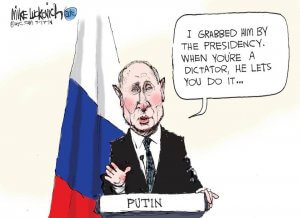
On Monday, July 16, media attention was fixed on the Finnish capital, where the U.S. and Russian presidents were meeting. The summit was a continuation of a long series of meetings between leaders of the world’s two superpowers, who in the past, frequently solved weighty problems dealing not only with bilateral relations, but also with international relations in general.
This time, of course, it was really difficult to find a basic theme, other than the banal assertion that talks between the two presidents (maybe) opened the door to further negotiations.
Meanwhile, the international community was expecting a lot from the meeting. Moscow and Washington support different sides of the conflicts in Syria and Ukraine. Even though they carefully avoid a direct clash, their stances are important for future settlement or reconciliation by the combatant parties.
Russia and the United States are also the strongest nuclear powers, controlling more than 90 percent of a total of roughly 15,000 extant nuclear warheads, and so agreements on reducing their number are decisive for nuclear disarmament as a whole.
The U.S. accuses Russia of violating 1987’s Intermediate-Range Nuclear Forces Treaty in Europe by deploying missiles with an estimated range of 1,550 miles in recent years, in contradiction of its obligations.
Another huge matter, which could and should have been negotiated, is the question of Russian interference not only in American presidential elections, but also in the inner workings of many other countries. Indictments against 12 Russian agents working for military intelligence were announced shortly before the summit, and the American public – and many others – were anxiously awaiting President Donald Trump’s stance on the issue.
Relations with North Korea could have been another significant topic, since Russia could bolster American efforts at disarming Kim Jong Un’s regime. Also, Washington would certainly welcome potential Russian assistance in the search for a restart with Tehran, because the U.S. administration, after withdrawing from the nuclear disarmament deal, has gotten itself into a blind alley-like situation.
Nothing came of the summit. Opposite the focused and highly-trained Vladimir Putin stood Trump, who thinks his gift for deal-making is an adequate substitute for careful preparation. The American side acceded to the Russian concept of “double truth,” avoided controversy, and thus did not negotiate anything substantive.
Even on the question of Russian interference in American elections, President Trump contented himself with the claim that, even though American intelligence services are convinced of Russian meddling, his counterpart Putin unequivocally denied such activities. We can only shake our heads over such ingenuousness, and for comic relief, suggest that Trump read Inspector Trachta’s book, “Pointless Questions in Criminology.”*
On the other hand, there’s no indication thus far that, during the summit, Ukrainian and Baltic officials’ worst nightmares came true. Roughly speaking, those consisted of the fear that President Trump would question the Western alliance’s obligation to defend the three former Soviet republics against Russian force. Or that he might recognize Russia’s occupation of Crimea and/or the creation of puppet “states” in eastern Ukraine in exchange for possible Russian concessions in other areas. According to available information, that didn’t happen, and so we can return to the original evaluation of the Russian-American summit as being “only” a superfluous meeting and a wasted opportunity.
It may be that the meeting will be a prelude to further negotiation, but so far nothing attests to that. If the American president isn’t better prepared and if Washington doesn’t push to put fundamental issues of international relations on the negotiating agenda, then similar meetings will not bring about anything significant. Russia will continue to aggressively define itself vis-à-vis its neighbors and seek to destabilize the European Union and the West as a whole. And democratic countries won’t know how to behave in the face of such Cold War reprises. They will waste time and effectively follow a script favorable to Moscow.
Vladimir Votapek is an international relations analyst and former consul general of the Czech Republic to the Russian Federation.
*Translator’s note: The reference is to a character from a 1984 Czech detective comedy film, also known from various stage productions.

Leave a Reply
You must be logged in to post a comment.